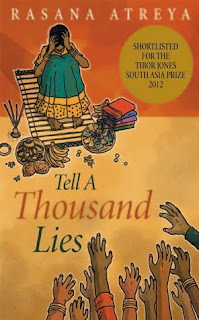Rasana writes:
Early this year the unpublished manuscript of my novel, Tell a Thousand Lies, was shortlisted for the 2012 Tibor Jones South Asia prize. I was ecstatic when I was offered a publishing contract soon after, by one of India’s largest publishing houses. Yet, I declined the offer.
Let me explain.
I would have been happy enough to have my paperback published. What I wanted were the rights to my ebook (the electronically downloadable form of a book). I’d been following the career paths of Amanda Hocking and Joe Konrath, the two authors leading the self-publishing charge, and I wanted a chance to apply their marketing methods to my ebooks. The publisher wasn’t agreeable though, so we parted ways, no hard feelings.
Rasana enrolled her book in Amazon's KDP Select program and, while it was free, 17,000 people downloaded it in one weekend! Since then Amazon has changed its ranking algorithm and she has decided to try out Barnes & Noble as well as Smashwords.com. She writes:
If you decide to self-publish, investigate your options carefully. It is
easy to get scammed on the Internet. To confuse the issue, a lot of
companies are calling themselves self-publishers. Self-publishing is
when you upload the book, you set the price, you track the sales, you
run the promotions. When someone else does it for you, they are the
publisher of record. Horror stories abound about these so-called
self-publishers; from manuscripts being stolen, to sales data being
fudged, I’ve heard them all.
If this seems too intimidating, reputable sites like bookbaby.com can
help for a one-time fee. If someone is charging you fees upfront and
keeping a cut of your royalties, beware. Reputable publishers will never
charge you for publication, which is why they take a cut in your
royalties. A quick and dirty way to check if the publisher is legitimate
is to look at their website. The focus of a legitimate publisher will
be the reader. Their website will be in the business of selling books. A
subsidy or vanity publisher’s focus will be you — the gullible writer —
and how many unneeded services they can sell to you.
I used CreateSpace to publish the paperback in the US (LighteningSource
and Lulu are the other options). I’m pleased to report my novel has
started to catch the attention of book buyers for public libraries
there. My novel shows up on flipkart.com etc. because I had it listed on
Ingram’s catalogue, but the international edition is too expensive for
India. The time is ripe in India for someone to replicate CreateSpace’s
business model, offering printed copies of books for sale, perhaps even
distribution to physical and online bookstores.
Does this mean I would rule out traditional publishers for my next book? Not at all. I am always open to new experiences.
Read the rest here:
My self-publishing journey.
Further reading:
-
Helping Writers De-Stress: Meditation Apps
-
Writers: In Order To Win We Must Embrace Failure
-
How To Sell 100 Books Per Day: 6 Things You Need To Do










